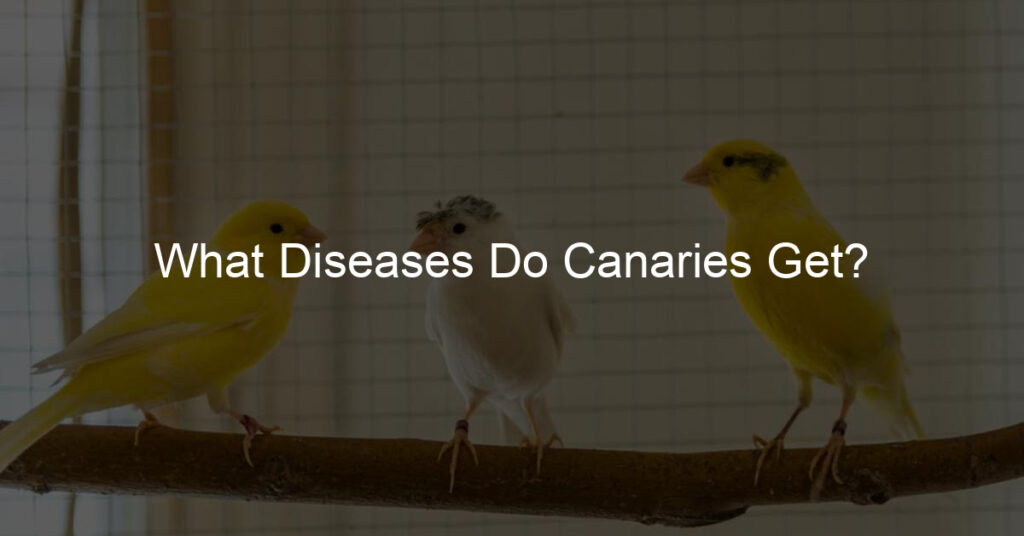Canaries are sensitive birds and can suffer from a wide range of diseases. Common illnesses among canaries include respiratory problems, mites, parasites, bacterial infections, fungal infections, avian pox, and cancer.
Respiratory diseases such as pneumonia, trichomoniasis (canker), and chlamydiosis often occur if the cage environment is too damp or cold.
These diseases are characterized by coughing and sneezing in addition to difficulty breathing. Treatment includes antibiotics to help fight infection and supportive care such as warm temperatures and humid air.
Parasitic infections can be caused by mites or lice that live in the bird’s feathers or skin. Symptoms include itching, scratching, and bald spots. Treatment involves getting rid of the parasites through topical treatments or baths.
Bacterial infections can occur due to a weakened immune system caused by stress or poor nutrition. Symptoms include lethargy, loss of appetite, and difficulty breathing. Treatment includes antibiotics to fight the infection as well as supportive care such as good nutrition and warm temperatures.
Fungal infections can also be problematic for canaries, particularly if they are kept in damp conditions with poor ventilation or sanitation habits.
Symptoms include sneezing, coughing, and wheezing. Treatment requires antifungal medications to help kill the fungus while addressing possible environmental causes such as humidity levels and lack of fresh air circulation.
Avian pox is another disease that can occur in canaries. This virus causes lesions on the bird’s skin, beak, and claws and may lead to difficulty eating or breathing.
Treatment involves keeping the bird warm and providing supportive care while administering antiviral medications to help fight off the infection.
Finally, cancer is a serious condition among canaries that can cause tumors and other abnormal growths around their bodies. Unfortunately, there isn’t much that can be done for this condition other than trying to keep them comfortable until they pass away naturally.
By taking steps to ensure your canary is living in a healthy environment with proper nutrition and sanitation habits, you are helping prevent illnesses such as those mentioned above from occurring.
If your canary becomes ill, it’s important to contact a veterinarian for diagnosis and treatment.
What Can Make a Canary Sick?
Aside from illnesses, canaries can become ill due to other factors as well. Poor nutrition, stress, and environmental conditions such as too much heat or cold can all lead to health problems in your pet bird.
Additionally, many birds are sensitive to synthetic fragrances and cleaning chemicals which may cause them respiratory distress. If you notice any of these signs, it’s essential to address the underlying cause quickly to help prevent further complications.
In conclusion, many diseases can affect a canary’s health if not managed properly. It’s important to understand what these diseases are and how they can be treated to provide your bird with the best possible care.
With proper precautions and treatment, you can help keep your canary healthy and happy for a long time.
How Do I Know if My Canary Has Mites?
Mites can be a common problem for pet birds, and unfortunately, they can go undetected until serious damage has already been done.
To check for mites on your canary, take a close look at its feathers and skin to see if you spot any tiny white or brown dots. Additionally, you may notice that the bird is scratching excessively or seems to be in discomfort.
If you suspect your canary may have mites, it’s important to take them to the veterinarian right away. The vet will do an examination and determine the best course of treatment. This may include oral medications, topical treatments, or baths with special solutions that help get rid of the parasites.
In conclusion, mites are a serious problem that can affect the health and well-being of your canary. It’s important to stay vigilant in monitoring for any signs of mite infestation and take action quickly if you think they may be present.
With proper treatment, you can help ensure your pet bird stays healthy and happy.
The Bottom Line
Canaries are amazing pets that bring joy and companionship into our lives, but like all animals, they are susceptible to illness if their environment and diet aren’t properly cared for.
By knowing what diseases can affect them and making sure their living conditions are appropriate, you can help keep them healthy and safe from harm.
It’s also important to remain alert for signs of parasites or mites, which can cause serious harm if left untreated. If you think your canary may be ill, it’s important to take them to a veterinarian for diagnosis and treatment as soon as possible.
By taking all of these steps, you can help ensure that your beloved pet bird will stay healthy and happy for many years to come.
What Foods Are Poisonous to Canaries?
Unfortunately, certain foods can be toxic to canaries if ingested. Some of the most common substances that should be avoided include onions, garlic, chocolate, avocado, and caffeine. Additionally, apple seeds and bitter almonds can also pose a threat to your pet’s health if consumed.
Try to make sure these items are kept out of reach of your bird at all times to prevent any accidental ingestion. If you think your canary has eaten something potentially hazardous, contact a veterinarian immediately for advice on how best to proceed.
In conclusion, it’s important to be aware of what foods may be poisonous to your pet bird to help keep them safe from harm. By avoiding hazardous foods and providing your canary with a nutritious diet, you can help ensure they stay healthy and happy for many years to come.
Do the Canaries Need To Go to the Vet?
Yes, canaries need to go to the vet just like any other pet. Regular check-ups can help identify potential health problems early and provide an opportunity to get your bird vaccinated against common diseases.
It’s also important for the vet to check for parasites or mites, as these can cause serious harm if left untreated.
If you think your canary may be ill, contact a veterinarian right away for advice on what steps to take next. By doing so, you’re helping ensure that your pet will stay safe and healthy in the long run.
In conclusion, it’s important to make sure your canary has regular vet visits to maintain its good health. With proper care and attention, you can help ensure that your beloved pet bird stays safe and happy for many years to come.
Additional Tips for Keeping Canaries Healthy
In addition to regular vet visits, there are some other steps you can take to keep your canary healthy. Provide them with a nutritious diet of seeds, fruits, and vegetables. Additionally, always make sure their cage is kept clean and the environment is not too wet or dry.
Make sure they have plenty of toys to play with to stay mentally stimulated. Give them plenty of time outside of the cage each day for exercise and fresh air as well.
Finally, it’s important to remain alert for any signs of illness or discomfort. If you think your canary may be ill, contact a veterinarian right away for advice on what steps to take next.
How Do I Keep My Canary Healthy?
By following the tips outlined above, you can help ensure your canary stays safe and healthy for many years.
Provide them with a nutritious diet, keep their cage clean and the environment comfortable, give them plenty of toys and exercise time outside of the cage, and remain alert for any signs of illness or discomfort.
If you think your canary may be ill, contact a veterinarian right away for advice on what steps to take next. With proper care and attention, you can help make sure your beloved pet bird stays safe and happy for many years to come.
In conclusion, it’s important to understand how to best care for your pet canary to keep them as healthy as possible.








